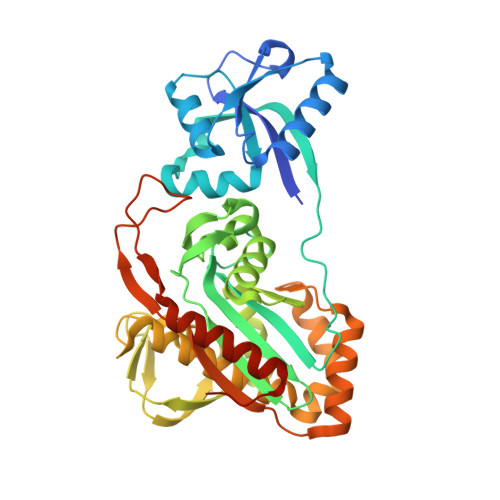Attachment of Capsular Polysaccharide to the Cell Wall in Streptococcus pneumoniae.
Eberhardt, A., Hoyland, C.N., Vollmer, D., Bisle, S., Cleverley, R.M., Johnsborg, O., Havarstein, L.S., Lewis, R.J., Vollmer, W.(2012) Microb Drug Resist 18: 240-255
- PubMed: 22432711
- DOI: https://doi.org/10.1089/mdr.2011.0232
- Primary Citation of Related Structures:
4DE8, 4DE9 - PubMed Abstract:
Streptococcus pneumoniae protects itself from components of the human immune defense system by a thick polysaccharide capsule, which in most serotypes is covalently attached to the cell wall peptidoglycan. Members of the LytR-Cps2A-Psr (LCP) protein family have recently been implicated in the attachment of anionic polymers to peptidoglycan in Gram-positive bacteria, based on genetic evidence from Bacillus subtilis mutant strains and on the crystal structure of S. pneumoniae Cps2A containing a tightly bound polyprenol (pyro)phosphate lipid. Here, we provide evidence that Cps2A and its two pneumococcal homologs, LytR and Psr, contribute to the maintenance of normal capsule levels and to the retention of the capsular polysaccharide at the cell wall in the capsular type 2 S. pneumoniae strain D39. GFP fusions of all three LCP proteins showed enhanced localization at mid-cell, indicating a role in cell wall growth. Single cps2A or psr mutants produced a reduced amount of capsule. A cps2A lytR double mutant showed greatly impaired growth and cell morphology and lost approximately half of the total capsule material into the culture supernatant. We also present the crystal structure of the B. subtilis LCP protein YwtF and provide crystallographic evidence for the phosphotransferase activity of Cps2A, supporting an enzymatic function in the attachment of capsular polysaccharides to cell wall peptidoglycan.
Organizational Affiliation:
Centre for Bacterial Cell Biology, Institute for Cell and Molecular Biosciences, Newcastle University , Newcastle upon Tyne, United Kingdom.
















